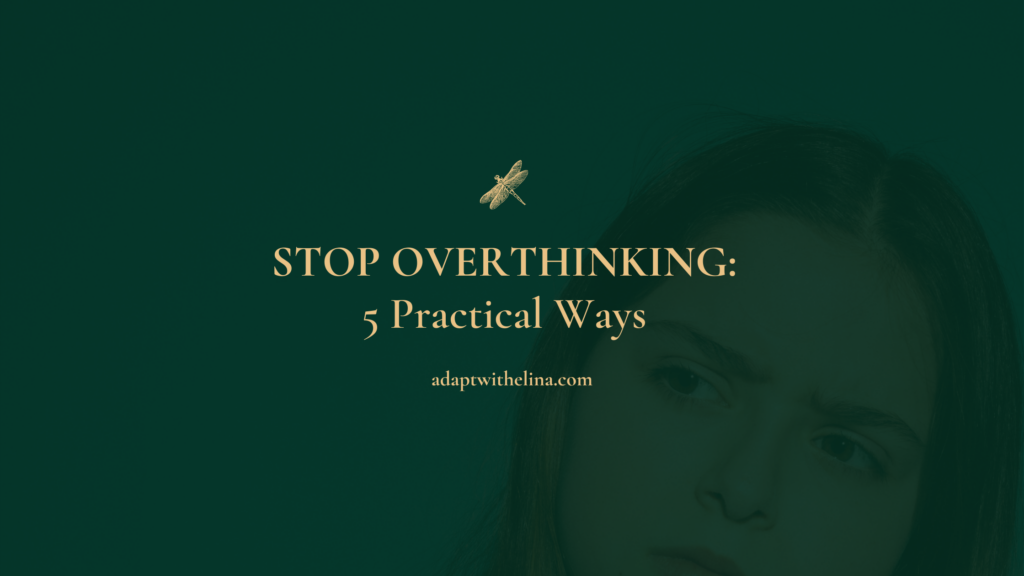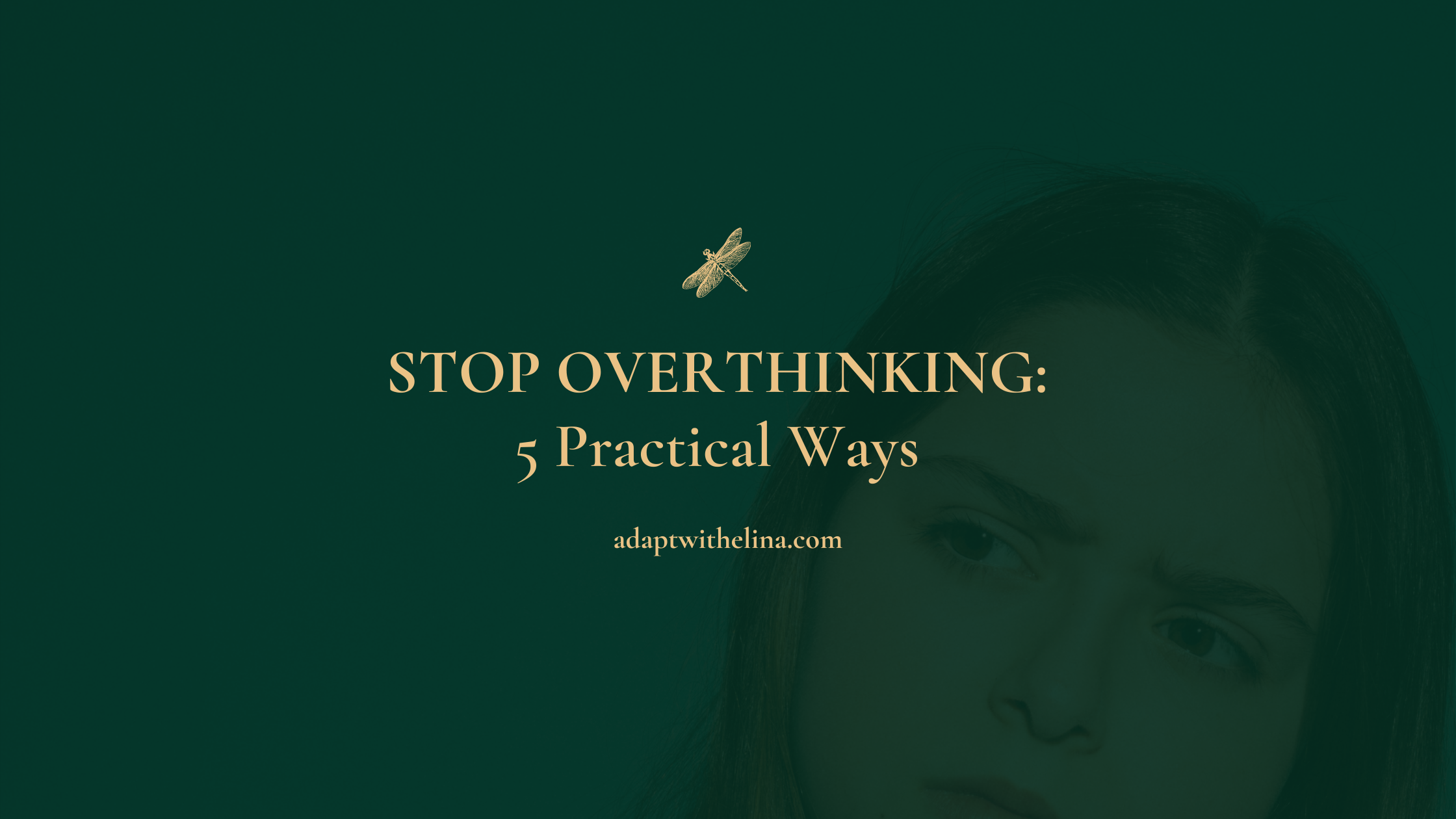How to stop overthinking and take action towards the things you want?
Sometimes it seemed that I’m the only person that struggles with that.
You might have experienced a similar situation like me, when friends and colleagues:
- moan how they are overthinking,
- loudly tell everyone how stressed they are all the time,
- but then, when it’s necessary, they go and simply do the things that they stress about.
Annoying, right?
Because if I was overthinking and stressed about the challenge, that was it! It stopped me from taking action.
And when I searched how to stop overthinking online, most of the information said:
just stop worrying and start doing!
Internet advice
Thanks, internet!
(I hope you read it in the ironic tone)
If we as human beings want to succeed, adapt to change successfully, and to step out of comfort zone, we NEED to learn practical ways how to stop overthinking.
So this is what I wish someone told me when I was struggling with overthinking.
Precise, practical things I can focus on to help me get out of my head and into the action.

Why are we overthinking?
A bit of context at first.
In most cases, we are worrying about something that
- has (or hasn’t) happened in the past or
- will happen (maybe) in the future (in most cases, no, it won’t), or
- is happening on the spot (during events, parties, meetings – “Am I interesting? How do I stand? Argh, what do I do with my hands?” etc.)
Since I’ve been observing the subject in my head for the past week, I’ve noticed 2 main themes as well – the obsessive thoughts are based on:
- something real, like, anxiety about me and “how it went/will go”, or
- imaginary scenarios, like, those random imaginary conflicts where I try to persuade someone or prove them wrong.
Do you have those? Drop a line on Social, I’d love to hear that I’m not alone 🙂
So, how to actually stop overthinking? What’s the secret?
For me the most effective has been – the change of focus.
Hear me out:
- Brain is designed to pop thoughts out all the time. That won’t change.
- Brain can focus on one thing at a time. That won’t change too.
Want to change the overthinking?
Change the focus.
I know it’s not so clear what it means, so, without further ado –
5 different ways how to stop overthinking:
1. Write it down.
When to do it:
It works best if you cannot sleep because of the racing thoughts, or are going through stressful times, and everything is just too much.
What to do:
- Set a timer for 15-30 minutes and write down everything that you think. Even if it’s not logical, even if you change the subject in the middle of the sentence. Write what you think.
- If you read this when you want to sleep and think – oh, no, I won’t do this, I’ll probably be sleeping after 15 mins – don’t fall into that trap. I know I have, and this turns out to be better to write it all off most of the time.
Why it works:
The fact that you put your thoughts on paper and see them in your face lets you understand how silly they are. So the pressure releases without you doing anything else.
But it’s important to end the exercise when you feel better, or it will make everything worse – my experience.
So, if you don’t have so much time, the next thing could be better for you.
2. ‘Free your speech’ exercise.
When to do it:
If you don’t have much time for writing, this exercise has the same effect, but it’s more intensive. I wouldn’t recommend this before bed, as it’s also energising a bit.
What to do:
- Set a timer for 1-2 minutes and
- say out loud everything you think, without stopping. There should be no silence.
Why it works:
It’s harder than it seems, but it releases the tension in a really powerful way.
There have been clients who say that it was so powerful they even cried and then felt pure like spring water from the Swiss Alps. But it has happened a few times, please, don’t expect it to happen 🙂
3. ‘Say my name’ technique
When to do it:
Do this when your mind creates an uncontrollable crazy-party and you just need to stop it.
What to do:
- Point a finger at the nearest thing and say nothing.
- Then point at the next thing and say what the previous thing was, then point to the third thing and say what the second was. For example, you point at the wall, say nothing; then point at the painting, say “wall”, etc.
- Continue for 1-2 minutes.
If there are people around, do it in your thoughts.
Why it works:
This exercise changes the focus from the past or future to the existing moment, and when you end it, there’s a short gap before the mind takes you under its control.
Use that gap to jump into action.
4. Find ‘Why’ you’re overthinking it
When to do it:
The previous techniques may cease the overthinking fire, but after some time you might experience that the overthinking is coming back again and again.
So, sooner or later you will have to face the deeper level. That’s what this is for.
Note: This exercise is suitable for those who simply seek practical tools, and would never substitute a help of a professional. Especially, if you’re experiencing uncontrollable anxiety or even panic attacks or signs of depression – please, seek professional help.
What to do:
- Define what you are overthinking about.
- Then ask yourself ‘Why’ to that sentence.
- Repeat 5-7 times, every time making the last answer the next question.
Example:
You obsessively overthink every time you need to do a presentation at work.
You can ask yourself:
- Why am I so obsessing over this presentation? Well, because I want to do the job well.
- Why do I want to do the job well? Because I want the boss to respect me.
- Why do I want the boss to respect me? Because I want to feel heard.
And so, you repeat 5-7 times or until you’ve got the feeling that you got to something.
Why it works:
It allows you to dig deeper and make better decisions on how to deal with it successfully.
But it takes radical honesty with yourself, so it may take some time and inner work until you find the answers. As I said earlier, digging deeper is recommended to do with a professional, especially if your anxiety is in such a level that you cannot control it.
5. Build proof.
This is the most powerful exercise that has worked for me.
What to do:
- Every evening for 30 days write down the situations when you figured out what to do. No matter how small.
- Then, milk them. Zoom in on these facts and look at them with sharp attention. Keep the feeling ‘I did it!’ as long as you naturally can.
Why it works:
After years of overthinking this has been the best cure for me, and some of my clients as well, but through the training program in general.
When they see through training that they CAN actually figure out what to do even when things don’t go as planned – it gives such a relief, frees natural spontaneity and lets you live life to the fullest both at work and life.
Alright.
Because you made it till the end, here’s a silly bonus.
BONUS. Stop overthinking with this silly technique
Often I cannot stop overthinking because I focus on everything that could go wrong.
So, what I have found really helpful is, to simply say:
Everything will be great! I’m going to do this SO well! It will be Per-fect! – in a more cheerful tone than is natural for me. (usually, I’m being specific, for example ‘The speech will turn out to be AWESOME! It will be the BEST speech I’ve EVER spoken!’)
It’s a bit embarrassing, because I haven’t shared this anywhere before, so please let me know in the comments if it even makes sense.
For me, the fake tone is so absurd that I can feel the mechanism of the overthinking mind burning. It doesn’t understand such reaction – I mean, it had to be scared, what’s happening! -, so usually the joy wins. I’m like, pushing the optimism onto me by surprise.
How is it different from positive affirmations?
In the effort that is put into them. The key for me is to say it in absurdly happy tone, and to do it alone, usually, in my car, while I’m driving.
So.
There are the practical tools to stop overthinking.
Were they useful? Write in the comments!
Also, make sure to subscribe to the newsletter to be the first to know when the next blog comes out, or stay tuned on Social!

Comments are closed